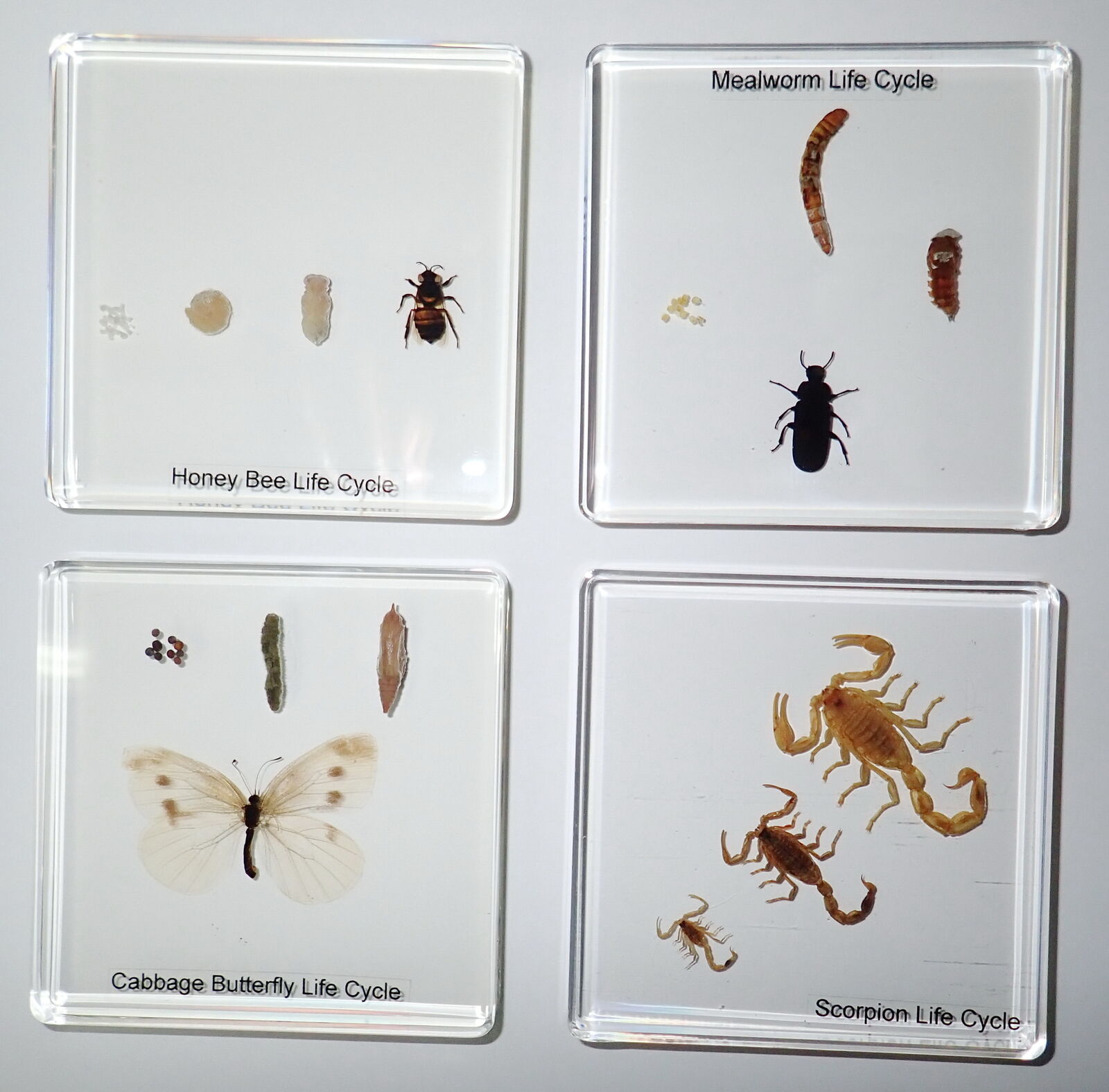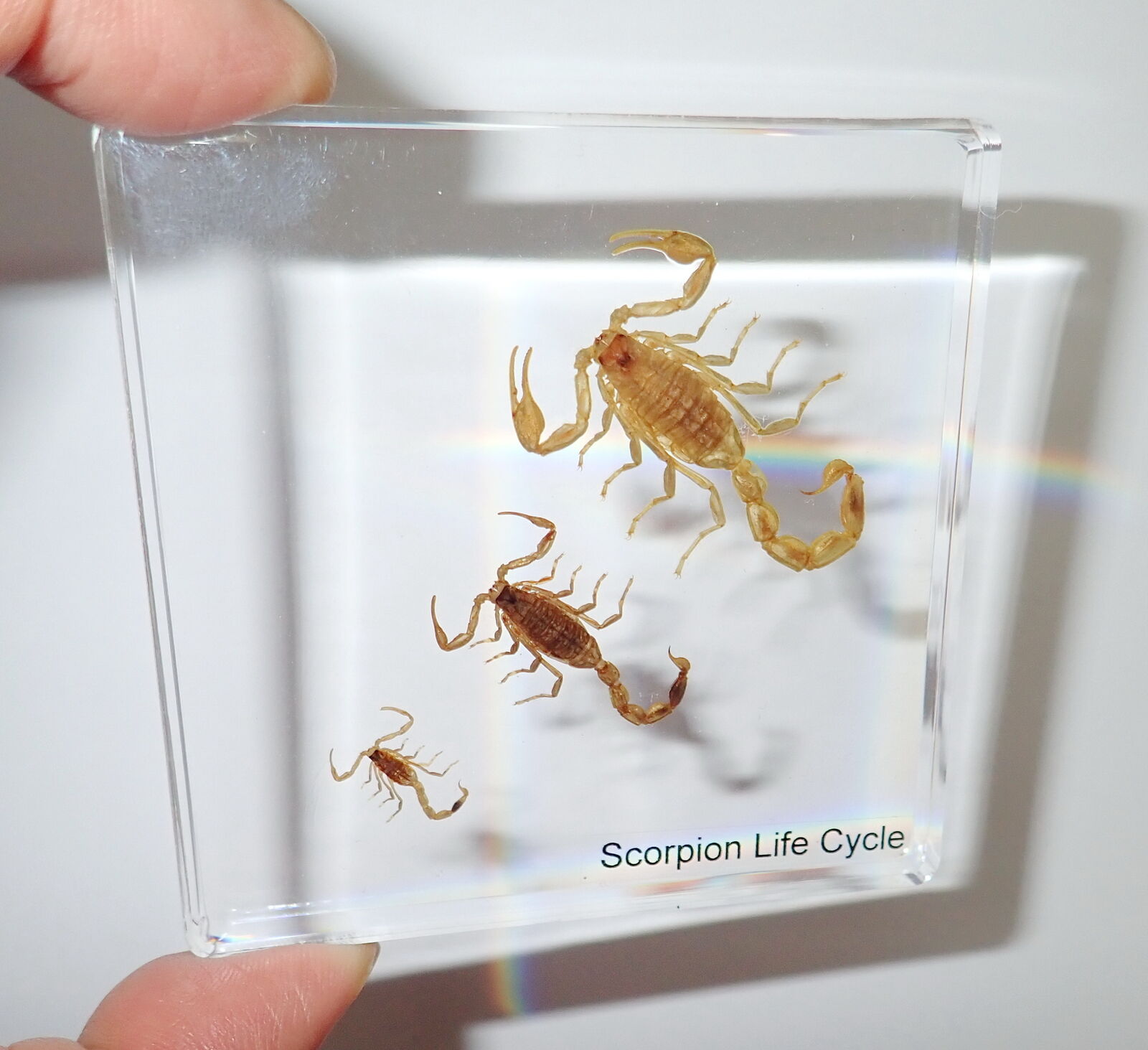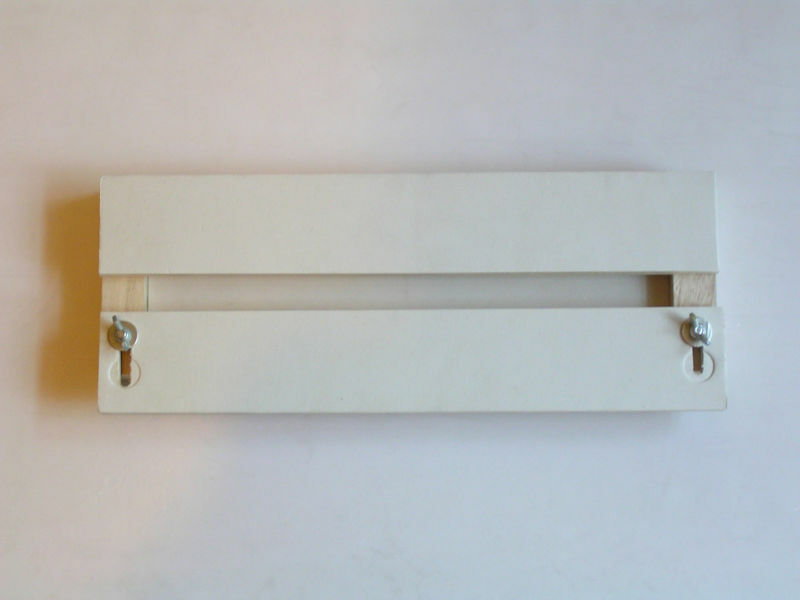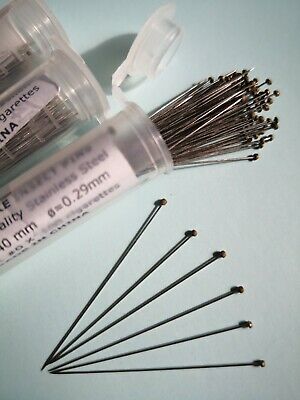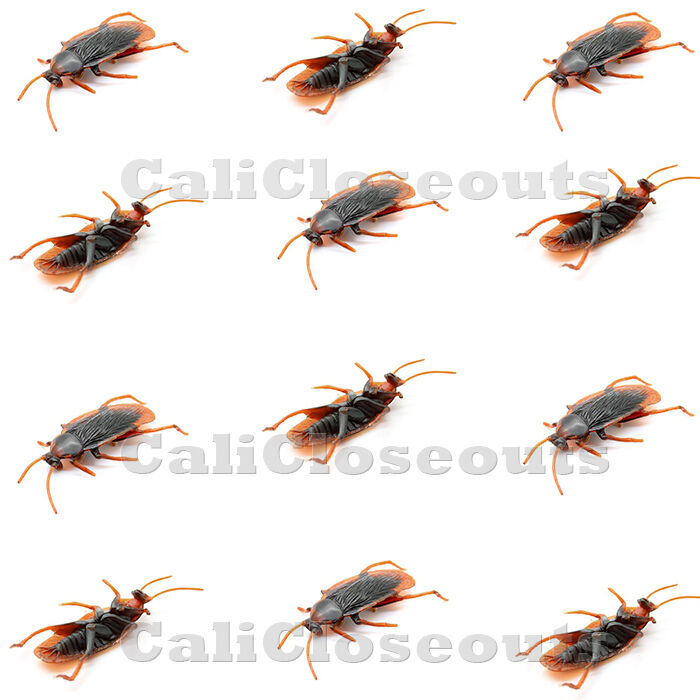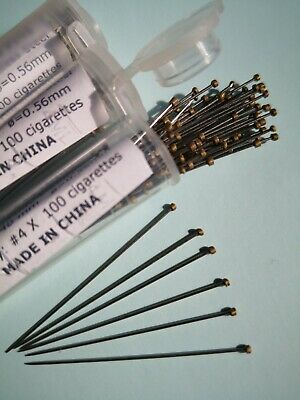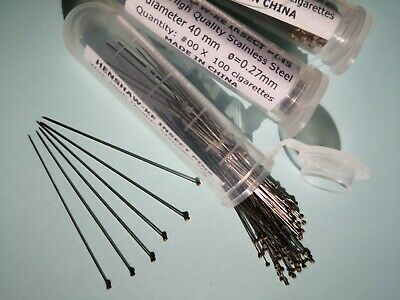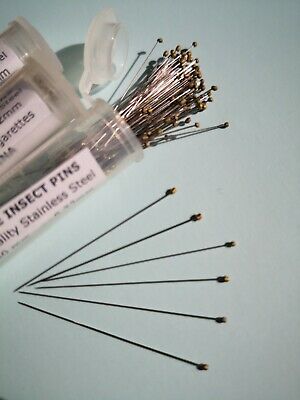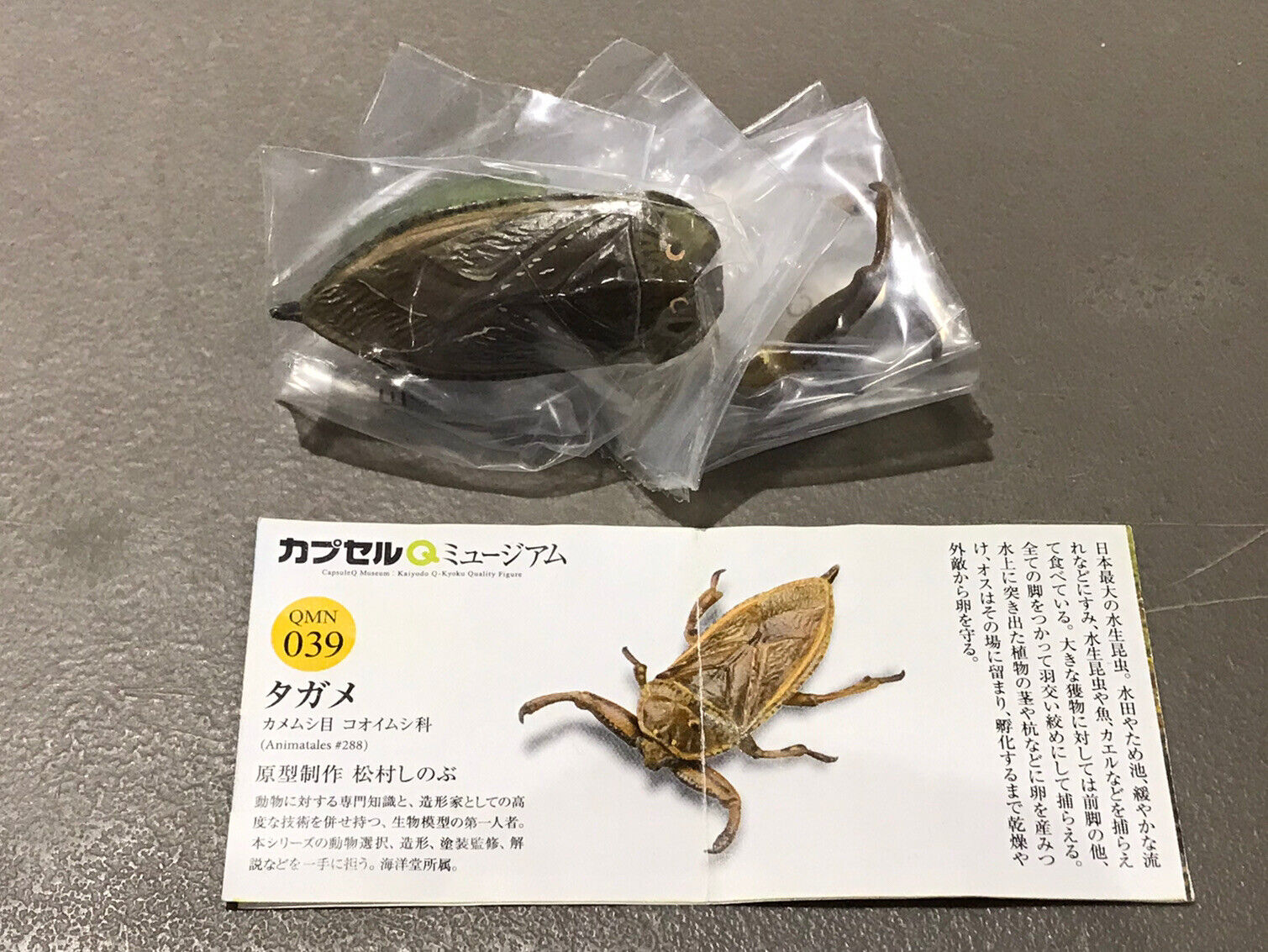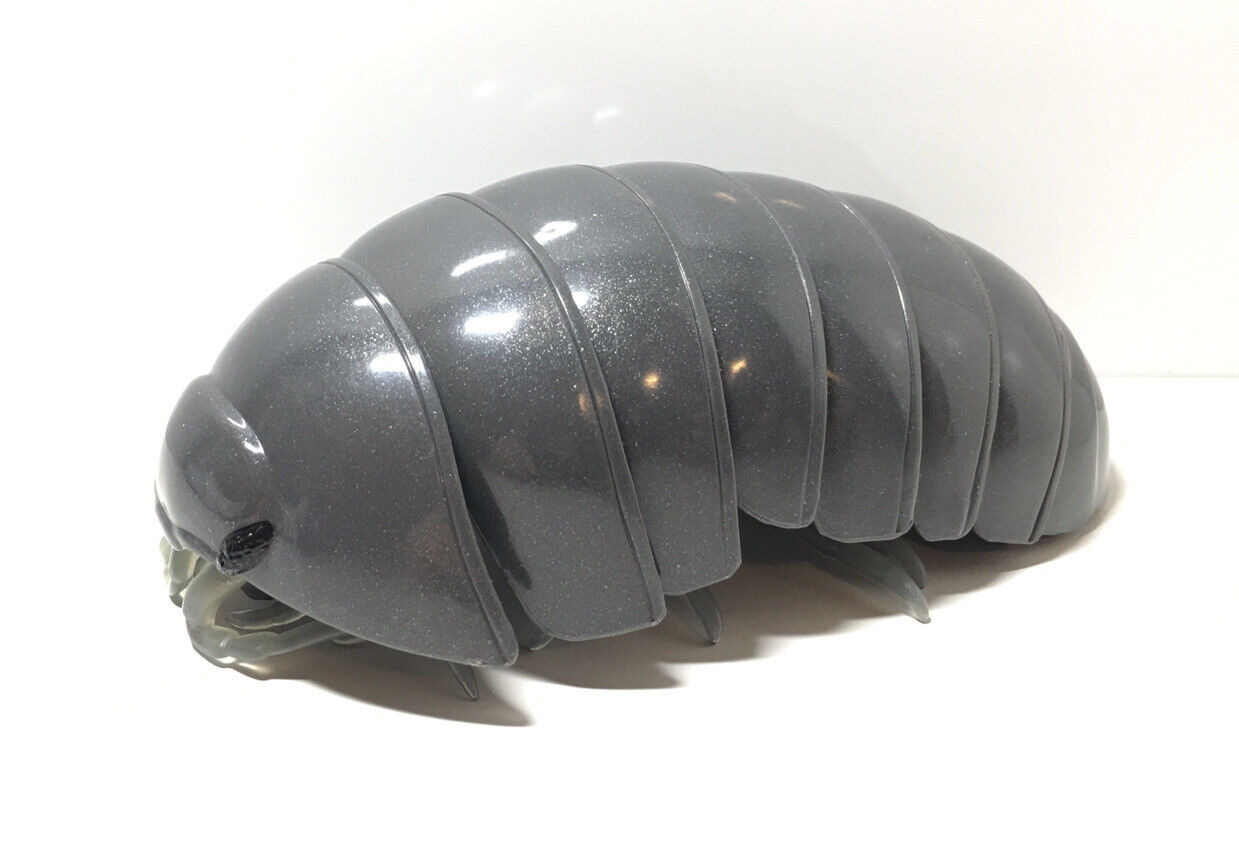-40%
4 Simplified Life Cycle Set Scorpion & Butterfly & Beetle & Bee Specimen Slide
$ 21.11
- Description
- Size Guide
Description
4 types of simplified insect Life Cycle: Mealworm Beetle - Tenebrio molitor, Honey Bee - Apis mellifera, Cabbage White Butterfly - Pieris rapae, Chinese Golden Scorpion - Mesobuthus martensii specimen encased in clear lucite material. The specimens are crystal clear, indestructible and transparent. Safe, authentic and completely unbreakable product put real life cycles right at your fingertips!Anyone can safely explore the life cycles from every angle.
They are clear enough for microscope observation.
Size of each lucite block is 75x75x9 mm (3x3x0.4 inch).
Weight of each lucite block is 60 gram.
Scorpion:
Selltotheworld
From all around the world
4 Simplified Life Cycle Set Scorpion & Butterfly & Beetle & Bee Specimen Slide
4 types of simplified insect
Life Cycle:
Mealworm Beetle -
Tenebrio molitor,
Honey Bee -
Apis mellifera,
Cabbage White Butterfly -
Pieris rapae,
Chinese Golden Scorpion -
Mesobuthus martensii
specimen encased in clear lucite material. The specimens are crystal clear, indestructible and transparent. Safe, authentic and completely unbreakable product put real life cycles right at your fingertips!
Anyone can safely explore the life cycles from every angle.
They are clear enough for microscope observation.
Size of each lucite block is 75x75x9 mm (3x3x0.4 inch).
Weight of each lucite block is 60 gram.
Scorpion:
1
)2nd Instar 2)3rd Instar 3)4th Instar
Honey Bee:
1) Eggs 2) Larvae 3) Pupae 4) Worker Bee
Butterfly:
1) Eggs 2)
Larva
3) Pupa 4) Adult Butterfly
Beetle:
1) Eggs 2) Larva 3) Pupa 4) Adult
These are ideal learning aids for students and kids and also very good collectible items for every body.
They are handmade real animal specimen crafts. Each one will be a bit different (specimen size, color and posture) even in the same production batch.
The pictures in the listing are just for reference as we are selling multiple pieces with same pictures.
***
Chinese Golden Scorpion -
Mesobuthus martensii
Order: Scorpiones Family: Buthidae Genus:
Mesobuthus
Species:
M. martensii
Common name:
Chinese Armortailed Scorpion, Manchurian Scorpion, Chinese Golden Scorpion
Scientific Name:
Mesobuthus martensii
Range:
China
Type:
Opportunistic Burrower
Communal:
yes
Full Grown Size:
3"
Growth Rate:
Medium
Temperature:
80-85F (26-29C)
Humidity:
50-60%
Temperament:
Semi Aggressive
Speed:
Medium
Venom:
3
Diet:
Young can eat Pinhead crickets, small roaches, meal worms. Adults can eat large crickets, roaches, super worms.
Housing:
Adults medium critter keeper, 2 gallon tank, or Rubbermaid type container. Young can live in small critter keepers or large deli cups
Substrate Depth/Type:
2-3" of peat/sand mix with rocks or hides. Pack down substrate and use flat rocks for them to create hides under
More info:
This species is fairly communal, if provided with enough hiding spaces. A good rule of 1 scorpion per gallon of tank space is ideal. They also breed quite readily and beginning to be a very common scorpion in the trade.
Mesobuthus martensii
is a species of scorpion in the family Buthidae. Its common names include
Chinese scorpion
,
Manchurian scorpion
,
Chinese armor-tail scorpion
and
Chinese golden scorpion
. Despite its common name, this scorpion is not only found in Manchuria or China, but also in Mongolia, Korea and Japan. Its preferred habitat is warm, dry areas with little vegetation.
M. martensii
can grow to about 6 centimetres (2.4 in) long, with females usually slightly larger, and has a life-span of about 4 to 6 years.
M. martensii
, especially its tail, has been used in traditional Chinese medicine for many centuries to treat various neuronal problems, such as chronic pain, paralysis, apoplexy and epilepsy. Over the past few decades, dozens of novel proteins in this scorpion's venom have been identified, cloned and investigated for clinical applications. For instance, at least 51 long-chain peptides related to the sodium channel toxins and 18 peptides related to the potassium channel toxins have been described, along with two peptides,
Bm
K AS and AS1, that act on ryanodine receptors. Apart from having analgesic properties,
Bm
K AS is also the first long-chain scorpion peptide reported to have antimicrobial activity. Amongst the sodium channel-specific neurotoxins, there are a number of muscle relaxants, such as makatoxin I and bukatoxin, while
Bm
KAEP and
Bm
K IT2 have shown anticonvulsant activity in experimental conditions, inhibiting epileptic seizures induced in rats.
Bm
K AGAP has both analgesic and antitumor properties and recombinant proteins could potentially be used in anticancer treatments.
Small Cabbage White
(
Pieris rapae
, family Pieridae, order Lepidoptera) are one of the commonest butterflies in tropical and sub-tropical regions. Its caterpillars feed on cabbages and other vegetables. It is slow in flying and easy to approach. The wings are white with black markings. Females typically lay single, elongate, ribbed eggs on host plants. The caterpillars have no spines or projections, but the pupae have a distinctive spiny projection that arises from the head end, and are held upright on the host plant by a silk "belt". They are often seen in groups around bird droppings, urine, or puddles in sunshine. They are serious pests of cabbage crops.
Honey Bee -
Apis mellifera
The Western honey bee or European honey bee (Apis mellifera) is a species of honey bee. This species was introduced to China from early 20th century and has been raised widely around the country.
In the temperate zone, honey bees survive winter as a colony, and the queen begins egg laying in mid to late winter, to prepare for spring. This is most likely triggered by longer day length. She is the only fertile female, and deposits all the eggs from which the other bees are produced. Except a brief mating period when she may make several flights to mate with drones, or if she leaves in later life with a swarm to establish a new colony, the queen rarely leaves the hive after the larvae have become full grown bees. The queen deposits each egg in a cell prepared by the worker bees. The egg hatches into a small larva which is fed by nurse bees (worker bees who maintain the interior of the colony). After about a week, the larva is sealed up in its cell by the nurse bees and begins the pupal stage. After another week, it will emerge an adult bee.
For the first ten days of their lives, the female worker bees clean the hive and feed the larvae. After this, they begin building comb cells. On days 16 through 20, a worker receives nectar and pollen from older workers and stores it. After the 20th day, a worker leaves the hive and spends the remainder of its life as a forager. The population of a healthy hive in mid-summer can average between 40,000 and 80,000 bees.
M
ealworm
B
eetle
-
Tenebrio molitor
Order: Coleoptera Family: Tenebrionidae Genus:
Tenebrio
Species:
T. molitor
M
ealworm beetle
is a species of darkling beetle. Like all holometabolic insects, they go through four life stages: egg, larva, pupa, and adult. Larvae typically measure about 2.5 cm or more, whereas adults are generally between 1.25 and 1.8 cm in length.
Mealworms are typically used as a food source for reptile, fish, and avian pets. They are also provided to wild birds in bird feeders, particularly during the nesting season, when birds are raising their young and appreciate a ready food supply. Mealworms are high in protein, which makes them especially useful as a food source. They are also commonly used for fishing bait.
They can be purchased at most pet stores and bait shops, and are available via mail order or internet suppliers (by the thousand). Mealworms are typically sold in a container with bran or oatmeal for food.
When rearing mealworms, commercial growers incorporate a juvenile hormone into the feeding process to keep the mealworm in the larval stage and achieve an abnormal length of 2 cm or greater.
Tenebrio molitor
is also used for biological research. Its relatively large size, ease of rearing and handling, and status as a nonmodel organism make it attractive for proof-of-principle study. Researchers worldwide, but particularly in Sheffield (UK) and Pusan (Korea), currently use this beetle as a model system for studies in biology, biochemistry, evolution, immunology and physiology.
Item Specifics
Modified Item :
No
Country/Region of Manufacture :
China
Material :
Resin
Type :
Collector Plate
Handmade :
Yes
Modification Description :
NA
California Prop 65 Warning :
NA
Payment
By Paypal
Shipping
Free shipping cost.
We send the goods to USA, Canada, UK, Australia, New Zealand, EU countries and some other European and Asian countries by E-express, a kind of fast postal service by Hong Kong Post. It usually takes about 6 to 10 working days for delivery.
We send the goods to other countries by registered airmail and will take about 8 to 14 working days for delivery.
Returns
Returns: We accept returns with any reason in 30 days.
Contact Us
We will answer buyer messages within 24 hours during working days.
Selltotheworld
From all around the world
DESCRIPTION
PAYMENT
SHIPPING
RETURN POLICY
CONTACT US
4 Simplified Life Cycle Set Scorpion & Butterfly & Beetle & Bee Specimen Slide
4 types of simplified insect
Life Cycle:
Mealworm Beetle -
Tenebrio molitor,
Honey Bee -
Apis mellifera,
Cabbage White Butterfly -
Pieris rapae,
Chinese Golden Scorpion -
Mesobuthus martensii
specimen encased in clear lucite material. The specimens are crystal clear, indestructible and transparent. Safe, authentic and completely unbreakable product put real life cycles right at your fingertips!
Anyone can safely explore the life cycles from every angle.
They are clear enough for microscope observation.
Size of each lucite block is 75x75x9 mm (3x3x0.4 inch).
Weight of each lucite block is 60 gram.
Scorpion:
1
)2nd Instar 2)3rd Instar 3)4th Instar
Honey Bee:
1) Eggs 2) Larvae 3) Pupae 4) Worker Bee
Butterfly:
1) Eggs 2)
Larva
3) Pupa 4) Adult Butterfly
Beetle:
1) Eggs 2) Larva 3) Pupa 4) Adult
These are ideal learning aids for students and kids and also very good collectible items for every body.
They are handmade real animal specimen crafts. Each one will be a bit different (specimen size, color and posture) even in the same production batch.
The pictures in the listing are just for reference as we are selling multiple pieces with same pictures.
***
Chinese Golden Scorpion -
Mesobuthus martensii
Order: Scorpiones Family: Buthidae Genus:
Mesobuthus
Species:
M. martensii
Common name:
Chinese Armortailed Scorpion, Manchurian Scorpion, Chinese Golden Scorpion
Scientific Name:
Mesobuthus martensii
Range:
China
Type:
Opportunistic Burrower
Communal:
yes
Full Grown Size:
3"
Growth Rate:
Medium
Temperature:
80-85F (26-29C)
Humidity:
50-60%
Temperament:
Semi Aggressive
Speed:
Medium
Venom:
3
Diet:
Young can eat Pinhead crickets, small roaches, meal worms. Adults can eat large crickets, roaches, super worms.
Housing:
Adults medium critter keeper, 2 gallon tank, or Rubbermaid type container. Young can live in small critter keepers or large deli cups
Substrate Depth/Type:
2-3" of peat/sand mix with rocks or hides. Pack down substrate and use flat rocks for them to create hides under
More info:
This species is fairly communal, if provided with enough hiding spaces. A good rule of 1 scorpion per gallon of tank space is ideal. They also breed quite readily and beginning to be a very common scorpion in the trade.
Mesobuthus martensii
is a species of scorpion in the family Buthidae. Its common names include
Chinese scorpion
,
Manchurian scorpion
,
Chinese armor-tail scorpion
and
Chinese golden scorpion
. Despite its common name, this scorpion is not only found in Manchuria or China, but also in Mongolia, Korea and Japan. Its preferred habitat is warm, dry areas with little vegetation.
M. martensii
can grow to about 6 centimetres (2.4 in) long, with females usually slightly larger, and has a life-span of about 4 to 6 years.
M. martensii
, especially its tail, has been used in traditional Chinese medicine for many centuries to treat various neuronal problems, such as chronic pain, paralysis, apoplexy and epilepsy. Over the past few decades, dozens of novel proteins in this scorpion's venom have been identified, cloned and investigated for clinical applications. For instance, at least 51 long-chain peptides related to the sodium channel toxins and 18 peptides related to the potassium channel toxins have been described, along with two peptides,
Bm
K AS and AS1, that act on ryanodine receptors. Apart from having analgesic properties,
Bm
K AS is also the first long-chain scorpion peptide reported to have antimicrobial activity. Amongst the sodium channel-specific neurotoxins, there are a number of muscle relaxants, such as makatoxin I and bukatoxin, while
Bm
KAEP and
Bm
K IT2 have shown anticonvulsant activity in experimental conditions, inhibiting epileptic seizures induced in rats.
Bm
K AGAP has both analgesic and antitumor properties and recombinant proteins could potentially be used in anticancer treatments.
Small Cabbage White
(
Pieris rapae
, family Pieridae, order Lepidoptera) are one of the commonest butterflies in tropical and sub-tropical regions. Its caterpillars feed on cabbages and other vegetables. It is slow in flying and easy to approach. The wings are white with black markings. Females typically lay single, elongate, ribbed eggs on host plants. The caterpillars have no spines or projections, but the pupae have a distinctive spiny projection that arises from the head end, and are held upright on the host plant by a silk "belt". They are often seen in groups around bird droppings, urine, or puddles in sunshine. They are serious pests of cabbage crops.
Honey Bee -
Apis mellifera
The Western honey bee or European honey bee (Apis mellifera) is a species of honey bee. This species was introduced to China from early 20th century and has been raised widely around the country.
In the temperate zone, honey bees survive winter as a colony, and the queen begins egg laying in mid to late winter, to prepare for spring. This is most likely triggered by longer day length. She is the only fertile female, and deposits all the eggs from which the other bees are produced. Except a brief mating period when she may make several flights to mate with drones, or if she leaves in later life with a swarm to establish a new colony, the queen rarely leaves the hive after the larvae have become full grown bees. The queen deposits each egg in a cell prepared by the worker bees. The egg hatches into a small larva which is fed by nurse bees (worker bees who maintain the interior of the colony). After about a week, the larva is sealed up in its cell by the nurse bees and begins the pupal stage. After another week, it will emerge an adult bee.
For the first ten days of their lives, the female worker bees clean the hive and feed the larvae. After this, they begin building comb cells. On days 16 through 20, a worker receives nectar and pollen from older workers and stores it. After the 20th day, a worker leaves the hive and spends the remainder of its life as a forager. The population of a healthy hive in mid-summer can average between 40,000 and 80,000 bees.
M
ealworm
B
eetle
-
Tenebrio molitor
Order: Coleoptera Family: Tenebrionidae Genus:
Tenebrio
Species:
T. molitor
M
ealworm beetle
is a species of darkling beetle. Like all holometabolic insects, they go through four life stages: egg, larva, pupa, and adult. Larvae typically measure about 2.5 cm or more, whereas adults are generally between 1.25 and 1.8 cm in length.
Mealworms are typically used as a food source for reptile, fish, and avian pets. They are also provided to wild birds in bird feeders, particularly during the nesting season, when birds are raising their young and appreciate a ready food supply. Mealworms are high in protein, which makes them especially useful as a food source. They are also commonly used for fishing bait.
They can be purchased at most pet stores and bait shops, and are available via mail order or internet suppliers (by the thousand). Mealworms are typically sold in a container with bran or oatmeal for food.
When rearing mealworms, commercial growers incorporate a juvenile hormone into the feeding process to keep the mealworm in the larval stage and achieve an abnormal length of 2 cm or greater.
Tenebrio molitor
is also used for biological research. Its relatively large size, ease of rearing and handling, and status as a nonmodel organism make it attractive for proof-of-principle study. Researchers worldwide, but particularly in Sheffield (UK) and Pusan (Korea), currently use this beetle as a model system for studies in biology, biochemistry, evolution, immunology and physiology.
Item Specifics
Modified Item :
No
Country/Region of Manufacture :
China
Material :
Resin
Type :
Collector Plate
Handmade :
Yes
Modification Description :
NA
California Prop 65 Warning :
NA
Payment
By Paypal
Shipping
Free shipping cost.
We send the goods to USA, Canada, UK, Australia, New Zealand, EU countries and some other European and Asian countries by E-express, a kind of fast postal service by Hong Kong Post. It usually takes about 6 to 10 working days for delivery.
We send the goods to other countries by registered airmail and will take about 8 to 14 working days for delivery.
Returns
Returns: We accept returns with any reason in 30 days.
Contact Us
We will answer buyer messages within 24 hours during working days.
All right reserved.
Shop Category
Store Home
Fossils
◈ Insects
◈ Plants
◈ Trilobite
◈ Sea animals
Tektite
◈ Loose lots
◈ Single stone
◈ Silver wired pendant
◈ Tiktite hanger
Lapis Lazuli
▷ Polished stones
♢ Loose lots
♢ Single stones
▷ Rough stones
♢ Loose lots
♢ Single stone
◈ Craft items
Turquoise
◈ Natural turquoise
◈ Turquoise substitutes
Stone carving
Rough Stone & mineral
◈ Single piece
◈ Loose lots
Polished Stone & mineral
◈ Single piece
◈ Loose lots
Rough ruby & sapphire
◈ Ruby
◈ Sapphire
Star Ruby & Sapphire
◈ Star Ruby - Opaque
◈ Star Ruby - Transparent
◈ Blue Star Sapphire
◈ Star Sapphire - other colors
Animal specimen items
◈ Life cycle
◈ Collection set
◈ Key ring
◈ Bracelet or bangle
◈ Necklace or pendant
◈ Magnet
◈ Ring
◈ Hanger
◈ Cabochon
◈ Sphere, ball
◈ Laminated specimen
◈ Computer mouse
◈ Stapler
◈ Pen
◈ Bottle Opener
◈ Dome paperweight
◈ Earring
◈ Skeleton
◈ Fish
▷ Single specimens
♢ Spider
♢ Scorpion
♢ Beetle
♢ Marine animal
♢ Bug
♢ Bee, wasp, hornet
♢ Other insects
♢ Bat
♢ Other animal
▷ Butterfly
♢ Butterfly paperweight
♢ Laminated butterfly
Plant specimen
◈ Flower
◈ Leaf
◈ Life Cycle
◈ Collection Set
◈ Laminated items
◈ Seed or root
Stone, mineral, fossil box set
Jewelry crafts
Paper cuts
◈ Small set
◈ Large set
◈ Single piece
Other
Hot Item
Insect Cabochon Golden Scorpion Oval 12x18 mm on Black Bottom 10 pieces Lot
USD 20.00
Insect Cabochon Golden Scorpion Oval 18x25 mm on black bottom 5 pieces Lot
USD 17.00
10 Mohs Scale Stone Set clear plastic box Learning Real Specimen Kit
USD 17.99
Black Indochinite Tektite Stone 10 pieces Plastic Box Set Natural Specimen Kit
USD 18.00
Chinese Water Snake Skeleton in 110x45x18 mm Block Education Animal Specimen
USD 35.00
Picture
New List Item
Large Black Indochinite Tektite Stone from China 63.8 gram 42x38x33 mm
USD 17.99
Black Indochinite Tektite Stone 65 gram 63x30x29 mm
USD 17.99
Large Black Indochinite Tektite Stone from China 91.6 gram 62x42x26 mm
USD 22.99
Large Black Indochinite Tektite Stone from China 31.1 gram 57x37x12 mm
USD 12.99
Black Indochinite Tektite Stone from China 15.8 gram 54x29x11 mm
USD 11.99
Custom Item
